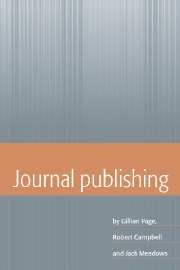Book contents
- Frontmatter
- Contents
- List of figures
- List of tables
- Preface
- 1 Introduction to journals
- 2 Editing
- 3 Production
- 4 Marketing
- 5 Subscription management and distribution
- 6 Non-subscription revenue
- 7 Legal and ethical aspects
- 8 Financial aspects
- 9 Bibliographic aspects
- 10 Managing a list of journals
- 11 Electronic publishing
- Appendix 1 Getting tenders for journals
- Appendix 2 Publishers' and editors' associations
- Glossary
- Bibliography
- Index
6 - Non-subscription revenue
Published online by Cambridge University Press: 23 October 2009
- Frontmatter
- Contents
- List of figures
- List of tables
- Preface
- 1 Introduction to journals
- 2 Editing
- 3 Production
- 4 Marketing
- 5 Subscription management and distribution
- 6 Non-subscription revenue
- 7 Legal and ethical aspects
- 8 Financial aspects
- 9 Bibliographic aspects
- 10 Managing a list of journals
- 11 Electronic publishing
- Appendix 1 Getting tenders for journals
- Appendix 2 Publishers' and editors' associations
- Glossary
- Bibliography
- Index
Summary
This chapter is devoted to sources of revenue other than subscriptions, sometimes called special sales. With some journals the profitability of these revenues is vital to the journal's financial success. In all cases it should be borne in mind, however, that these other revenues involve additional costs. Even collecting a permission fee will involve raising an invoice and checking on payment. Storing and insuring back issues is expensive, and organising advertisements, offprints, mailing lists, page charges, establishing arrangements with document supply organisations and copyright collection agencies, and licensing directly with customers all add to overheads. Apart from offprints, which are often offered as a service to authors without any expectation of extra profits, all these items should help to improve the journal's financial position; but they will only do so if realistic rates are charged and procedures are well thought out and followed carefully.
Outside the usual sources of non-subscription revenue there is the possibility of obtaining grants to assist publication. Such funding is generally only obtainable for specific projects: these may include reducing a backlog of papers, publishing papers given at a meeting sponsored by the grant-giving body, inserting colour plates or the distribution of free or low-priced copies to a specified group (for example, certain libraries in the Third World or East Europe or favoured customers of products from a company). Usual sources are national academies, foundations, UNESCO and commercial concerns.
- Type
- Chapter
- Information
- Journal Publishing , pp. 205 - 239Publisher: Cambridge University PressPrint publication year: 1997

